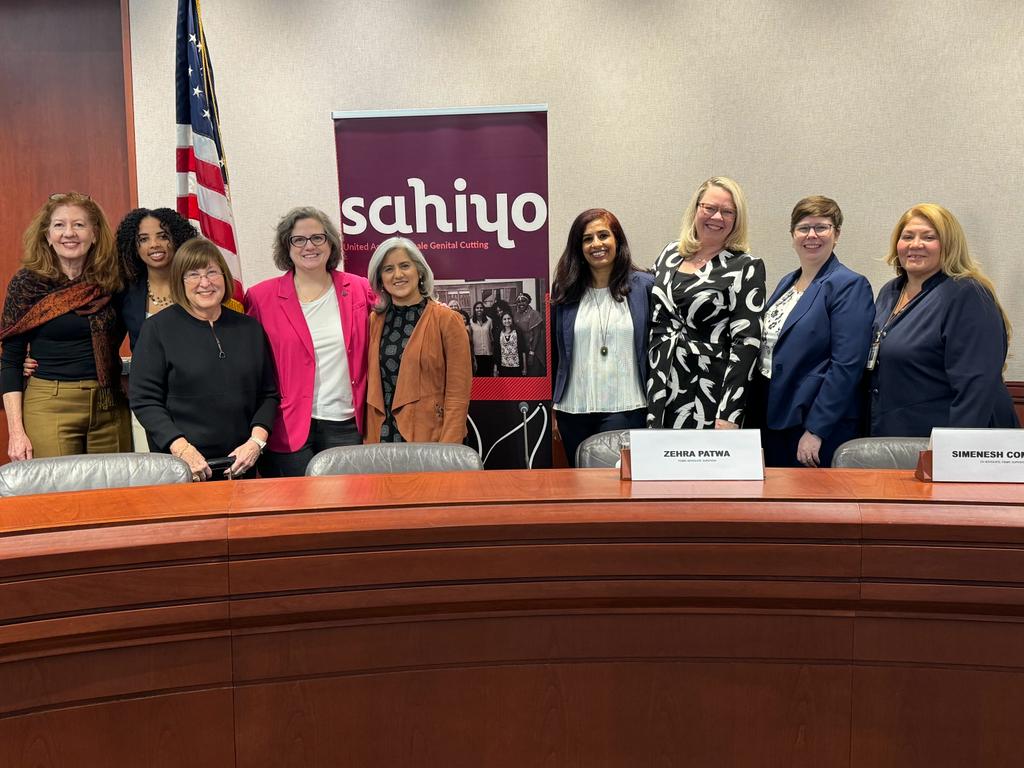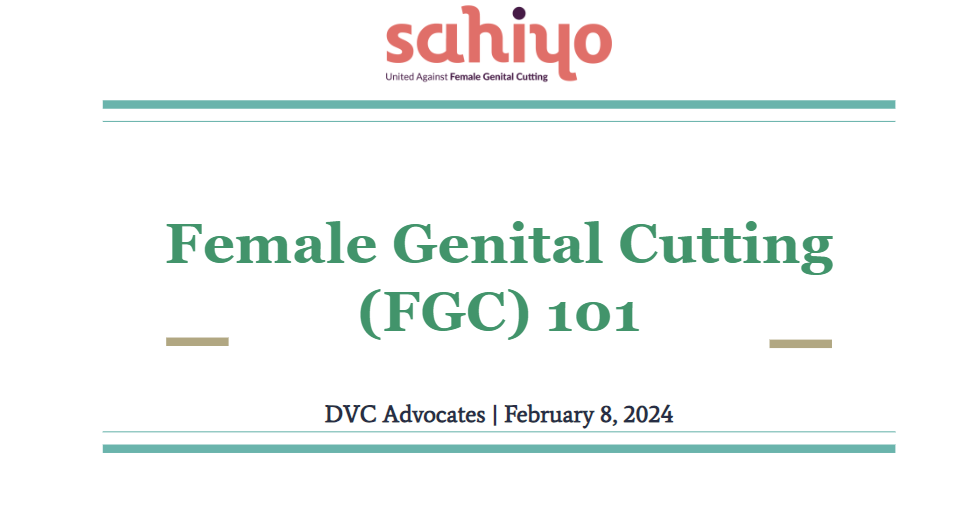Staff Spotlight Community Engagement Coordinator: Samman Masud

Samman received a Bachelor’s in International Relations and her Master’s in Interdisciplinary Studies with a focus in Human Rights and Women & Gender Studies from George Mason University. Her graduate research explored the intersection of human rights advocacy and social media platforms in light of the #Metoo movement and the possibilities of transnational feminist solidarity networks in the digital media age. Samman is driven by her passion for local and global social justice movements and imagines a feminist future, one that is free from patriarchal violence and emancipatory for all people. In the past, Samman has been affiliated with Amnesty International USA in various capacities, where she supported campaigns on violence against women, migrant and refugee rights, death penalty and other human rights violations in the U.S. and abroad. Samman is excited to utilize her experiences in human rights advocacy, particularly her strengths in gender justice and intersectional feminist activism to address female genital cutting in her new role as the community engagement coordinator for Sahiyo. When and how did you first get involved with Sahiyo? I first got involved with Sahiyo in the summer of 2023 when as the Community Engagement Coordinator. Previously I had briefly explored the issue of FGC in various classes during graduate school while studying Women and Gender Studies, but I had never studied the topic as exhaustively as I would have liked to. In one of my courses, I read an academic paper where sociologists presented FGC as an issue of feminist agency and choice, likening it to cosmetic plastic surgeries. Other times, I found the sensationalized framing of FGC by human rights groups and legacy media to be problematic in how it recreated racist tropes about communities where FGC is practiced, further marginalizing at-risk groups and alienating them. So when the opportunity at Sahiyo came along, I became eager at the prospect of working for a survivor-led organization, since community-led movements can challenge false narratives and include a culturally sensitive approach that is vital in the field of gender-based violence work. What does your work with Sahiyo involve? I’m responsible for overseeing the Activists Retreat program, an annual in-person as well as a virtual event in which anti-FGC activists and survivor-advocates come together from all over the U.S. to discuss activism strategies on how to better mobilize more advocates working to address FGC within South Asian communities. In addition to assisting with the logistics of the retreat planning, I dedicate the rest of my time fostering relationships with a community of activists and assisting them in their anti-FGC activism. I do this by supporting their advocacy needs, whether it is through virtual alumni network events like quarterly meet-ups or book club meetings, or providing them with essential resources and news about FGC-related developments. Bhaiyo, our male engagement program is another project I support. In this program I oversee our male ally network and build new relationships with individuals or activists who want to be allies in our mission to end FGC. I hope to grow this network significantly, so a larger community of men can discuss the harmful impacts of FGC within their circles, especially if they belong to communities where FGC is practiced. Gender-based violence is a function of patriarchy, and without male allies who can be agents in disrupting patriarchal norms, our work would be impossible. How has your involvement with Sahiyo impacted your life? Before Sahiyo, my knowledge about FGC was limited and only theoretical. Now I get to see firsthand the practical implications of FGC, in my encounters with survivors and how FGC has profound long term psychological and medical consequences. Through my daily engagement with Sahiyo’s collaborations and with other sister organizations and other growing partnerships, I’m now more aware of FGC advocacy, and the landscape of gender-based violence work in general, as well as of the many resources that are available to communities where FGC is prevalent. As such, the need to publicize Sahiyo’s work becomes all the more urgent. Finally, my understanding of activism continues to grow from my interactions with different activists throughout the year. I find that all types of activism are impactful, as our Executive Director, Mariya Taher emphasizes understanding “activism on a spectrum” and how it can look different for each activist. Similarly, I was not aware of the concept of ‘public vs. private’ activism that Sahiyo’s work and activists place immense value on. Modern day digital activism, albeit critical to mobilizing masses for human rights issues, sometimes has confined us to thinking of activism only in terms of likes, tweets and viral stories. However, private activism can be a just as powerful tool in educating members of communities about a particular issue, as I saw in my first Activists Retreat in September 2023, where the privacy of an insular activist community was respected and led to important conversations about FGC prevalent within the Bohra community. As such, both public and private activism can drive incremental change and lead to progressive reform. The personal is political, indeed. What words of wisdom would you like to share with others who may be interested in supporting Sahiyo and the movement against FGC? The movement against FGC is equally critical as any other issue in gender-based violence work. We are working to mobilize a large body of activists to bring our movement to the forefront and push the remaining states to pass legislation banning FGC in the U.S. I encourage anyone interested in advancing women’s rights and gender justice to explore Sahiyo’s anti-FGC work as part of the larger gender based violence effort. Our small but mighty team at Sahiyo and the network of amazing volunteers and interns welcome and support all advocates, regardless of their expertise about FGC, to join this important cause.
Connecticut Hosts a Legislative Briefing on Jan 25th

On January 25, 2025, the Connecticut (CT) Commission on Women, Children, Seniors, Equity and Opportunity, Representative Jillian Gilchrest, CT General Assembly Bi-Partisan Women’s Caucus, and the CT Coalition to End FGM/C held an event, just prior to the next legislative session, entitled Preventing FGM/C in Connecticut – Why Comprehensive Laws Matter. Special guests and co-hosts included Lieutenant Governor Susan Bysiewicz and the Governor’s Council on Women & Girls. The panel discussion that occurred during the event provided timely information and resources for legislators and their staff about FGM/C in the United States, as well as the need for comprehensive state laws to end the practice. Panelists shared their experiences and lessons they learned from legal reform processes in other states, which highlighted the important role of the law in changing social norms as well as protecting survivors, girls at risk, and society as a whole. The diverse panel of international, national, and local experts included women’s rights advocates, FGM/C service providers, and FGM/C survivors such as: Moderators: Rep. Jillian Gilcrest Steven Hernández Panelists Siminesh Comollo, CT Coalition to End FGM/C Caitlin LeMay, The US End FGM/C Network Zehra Patwa, Co-Founder and US Lead, WeSpeakOut Mariya Taher, Sahiyo: US Jill Thompson, Equality Now To date, 41 US States have enacted laws prohibiting the practice of FGM/C. Connecticut is one of nine states that has not yet addressed this harmful practice. This event was held in partnership with Sahiyo U.S.ahiyo U.S., Equality Now, and, the US End FGM/C Network.S End FGM/C Network. Watch a recording of the event here. In support of passing a law on FGM/C, this February 6th – International Day of Zero Tolerance for FGM/C, Governor Ned Lamont issued a Proclamation and Lieutenant Governor Susan Bysiewicz issued a Citation to commemorate the day.
Training the San Francisco Domestic Violence Consortium on FGC in honor of Zero Tolerance Day for FGC.

We are delighted to share insights from a training session hosted by Sahiyo in partnership with the San Francisco Domestic Violence Consortium (SF-DVC) on February 8, 2024. Our “FGC-101,” training aimed to shed light on the complex issue of female genital cutting (FGC) and uplift the ongoing collaborative efforts between Sahiyo and AWS on expanding gender-based violence (GBV) services to support survivors of FGC. This training was delivered to 16 advocates and community-based attorneys from the San Francisco Bay area. Led by Sahiyo’s Executive Director, Mariya Taher, and T&TA Coordinator, Aries Nuño, and Orchid Pusey from the Asian Women’s Shelter the training provided a comprehensive overview of FGC, including its physical and psychological impacts, global and U.S. perspectives, effective strategies for supporting survivors. These positive reflections from the participants underscored the importance of our collaborative efforts to address GBV and the value of providing informative and engaging educational experiences: “Thank you for your work! Looking forward to learning more and I appreciate AWS’s leadership on this matter.” “Thank you for a super engaging presentation! I learned a lot.” This initiative is part of our ongoing commitment to educate, engage, and empower advocates, enhancing their ability to offer crucial services to those affected by FGC. We extend our gratitude to the participants for their active engagement and to the San Francisco Domestic Violence Consortium for their partnership! For more training and technical assistance information contact aries@sahiyo.org.
